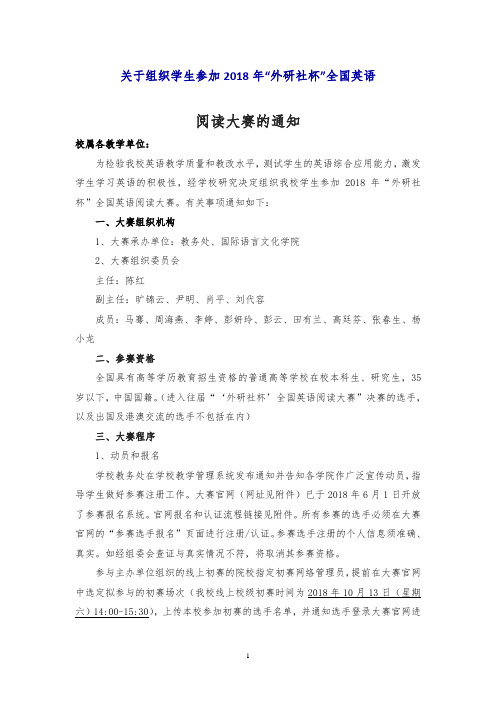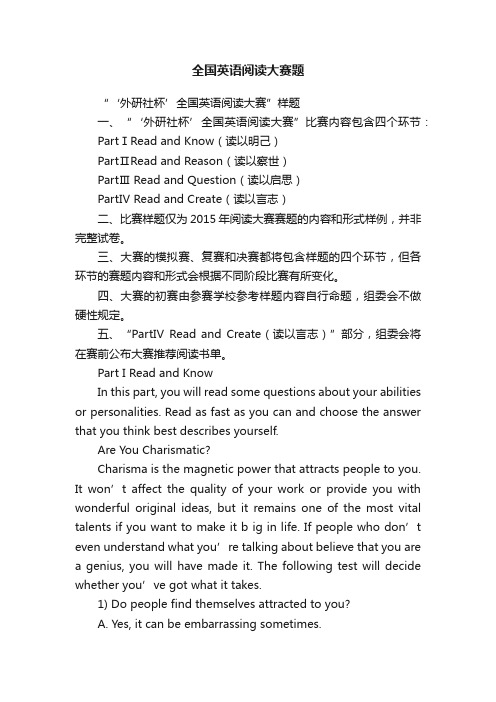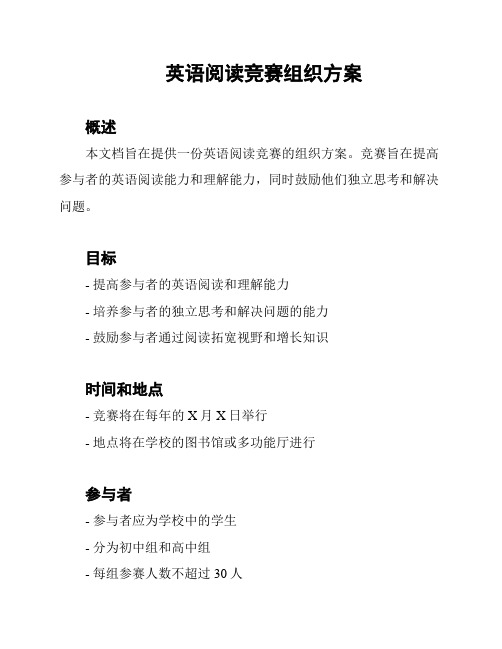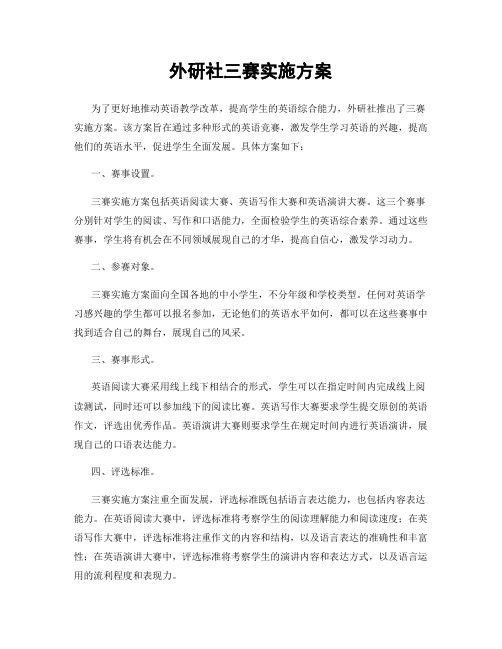外研社阅读大赛赛制
关于组织学生参加2018年外研社杯全国英语

关于组织学生参加2018年“外研社杯”全国英语阅读大赛的通知校属各教学单位:为检验我校英语教学质量和教改水平,测试学生的英语综合应用能力,激发学生学习英语的积极性,经学校研究决定组织我校学生参加2018年“外研社杯”全国英语阅读大赛。
有关事项通知如下:一、大赛组织机构1、大赛承办单位:教务处、国际语言文化学院2、大赛组织委员会主任:陈红副主任:旷锦云、尹明、肖平、刘代容成员:马骞、周海燕、李婷、彭妍玲、彭云、田有兰、高廷芬、张春生、杨小龙二、参赛资格全国具有高等学历教育招生资格的普通高等学校在校本科生、研究生,35岁以下,中国国籍。
(进入往届“‘外研社杯’全国英语阅读大赛”决赛的选手,以及出国及港澳交流的选手不包括在内)三、大赛程序1、动员和报名学校教务处在学校教学管理系统发布通知并告知各学院作广泛宣传动员,指导学生做好参赛注册工作。
大赛官网(网址见附件)已于2018年6月1日开放了参赛报名系统。
官网报名和认证流程链接见附件。
所有参赛的选手必须在大赛官网的“参赛选手报名”页面进行注册/认证。
参赛选手注册的个人信息须准确、真实。
如经组委会查证与真实情况不符,将取消其参赛资格。
参与主办单位组织的线上初赛的院校指定初赛网络管理员,提前在大赛官网中选定拟参与的初赛场次(我校线上校级初赛时间为2018年10月13日(星期六)14:00-15:30),上传本校参加初赛的选手名单,并通知选手登录大赛官网进行认证,认证完成后方可视为报名成功。
请务必早于选定的比赛时间一周完成所有选手的认证工作,以保证比赛当天选手正常比赛。
我校注册报名截止时间:2018年10月6日24:00。
2、初赛比赛方式:各参赛学校作为初赛赛点,由本校外语院(系)或大学外语教学部负责组织实施,云南省大学外语教学研究会给予协助与支持,进行线上出赛。
比赛不允许携带电子设备,不允许使用网络。
参赛院校提前将本校所有参赛选手完成注册报名,届时组织本校所有参赛选手登录大赛官网进行比赛。
全国英语阅读大赛题

全国英语阅读大赛题“‘外研社杯’全国英语阅读大赛”样题一、“‘外研社杯’全国英语阅读大赛”比赛内容包含四个环节:PartⅠRead and Know(读以明己)PartⅡRead and Reason(读以察世)PartⅢ Read and Question(读以启思)PartⅣ Read and Create(读以言志)二、比赛样题仅为2015年阅读大赛赛题的内容和形式样例,并非完整试卷。
三、大赛的模拟赛、复赛和决赛都将包含样题的四个环节,但各环节的赛题内容和形式会根据不同阶段比赛有所变化。
四、大赛的初赛由参赛学校参考样题内容自行命题,组委会不做硬性规定。
五、“PartⅣ Read and Create(读以言志)”部分,组委会将在赛前公布大赛推荐阅读书单。
Part I Read and KnowIn this part, you will read some questions about your abilities or personalities. Read as fast as you can and choose the answer that you think best describes yourself.Are You Charismatic?Charisma is the magnetic power that attracts people to you. It won’t affect the quality of your work or provide you with wonderful original ideas, but it remains one of the most vital talents if you want to make it b ig in life. If people who don’t even understand what you’re talking about believe that you are a genius, you will have made it. The following test will decide whether you’ve got what it takes.1) Do people find themselves attracted to you?A. Yes, it can be embarrassing sometimes.B. No, no more than other people.C. I suppose they do a bit.2) Do you find that people agree with you regardless of the quality of your arguments?A. No, never.B. Not that often.C. All the time.3) Would you find it easy to attract followers?A. No, not at all.B. Not very easy.C. Yes, it’s really no problem.4) Do you find casual acquaintances open up and tell you their life stories in intimate detail?A. Occasionally.B. Never.C. Happens all the time. Sometimes I just can’t get away....Part II Read and ReasonIn this part, you will read texts of different forms and genres. Read the instructions carefully and answer the questions based on your comprehension, analysis and inferences of the texts.1. Among the four statements below, one statement is the main point, and the other three are specific support for the point. Identify the main point with P and the specific support with S.___A. Hungry bears searching for food often threaten hikers.___B. Hiking on that mountain trail can be very dangerous.___C. Severe weather develops quickly, leaving hikers exposed to storms and cold.___D. When it rains, the trail, which is very steep at some points, becomes slippery.2. Read the following cartoon. Put a tick by the three statements that are most logically based on the information suggested by the cartoon.___A.Lucy has just criticized the boy, Linus.___B. Linus feels Lucy’s criticism is valid.___C. Lucy feels very guilty that Linus has taken her criticism badly.___D. Lucy doesn’t seem to realize that people may accept constructive criticismbut reject destructive criticism.___E. The cartoonist believes we should never criticize others.___F. The car toonist believes it’s best to criticize others in a constructive way.3. Read an extract of an advertisement. Choose the answer which you think fits each question best according to the text.Young Environmental Journalist CompetitionHow to Enter:☆If you’re aged 16-25, we’re looking for original articles of 1,000 words (or less) with an environmental or conservation theme. The closing date for entries is 30 December, 2015.☆ Your article should show proof of investigative research, rather than relying solely on information from the Internet and phone interviews. You don’t have to go far. A report on pollution in a local stream would be as valid as a piece about the remotest rain forest.☆ Your article should show you are passionate and knowledgeable about environmental issues. It should also beobjective and accurate, while being creative enough to hold the reader’s interest. We are not looking for “think pieces” or opinion columns.☆ Your aim should be to advance understanding and awareness of environmental issues. You should be able to convey complex ideas of readers of this general interest magazine in an engaging and authoritative manner.☆Facts or information contained in short-listed articles will be checked.☆ Read the rules carefully.1) Before entering for the competition, young people must have_______.A. conducted some relevant research in their local areaB. gained a qualification in experimental researchC. uncovered some of the evidence in the research by themselvesD. consulted a number of specialists on the subject under research2) The articles submitted must_______.A. focus on straightforward conceptsB. include a range of viewsC. be accessible to non-specialistD. reveal the writer’s standpoint4.Read the passage below. Then choose the best answer to each question that follows.(1) Johnny Appleseed, one of the gentlest and most beloved of American folk heroes, was born in 1774in Leominster, Massachusetts. (2) His real name was John Chapman. (3) Chapman’s early li fe was full of misfortune. (4) First, his father left home to fight in the Revolutionary War. (5)Then John’s mother and baby brother died before John’s second birthday. (6) However, John’s fortunes improved when his father returned and remarried, and by the time John was in his teens, he had ten brothers and sisters.(7) As a young man, John began traveling west on foot, stopping to clear land and plant the apple seeds he always carried with him. (8) Settlers who followed John’s path were delighted to fin d young apple orchards dotting the landscape.(9) John was a friendly fellow who often stopped to visit with families along his way, entertaining them with stories of his travels. (10) Tales of his exploits followed him through Pennsylvania, Ohio, and Indiana. (11) Many of the stories were true. (12) For instance, John really did travel barefoot through the snow, lived on the friendliest of terms with Indian tribes, and refused to shoot any animal. (13) Other tales about John, however, were exaggerations. (14) Settlers said, for example, that he slept in the treetops and talked to the birds or that he had once been carried off by a giant eagle. (15) Johnny Appleseed never stopped traveling until his death in Fort Wayne, Indiana, in 1845.1) Sentence 1 is a statement of_______.A. factB. opinionC. fact and opinion2) The details in sentences 4 and 5 support the point or points in _______.A. sentence 1B. sentence 2C. sentence 3D. sentence 63) The relationship between sentences 3 and 6 is one of_______.A. contrastB. additionC. cause and effectD. comparison4) We can conclude that Johnny Appleseed _______.A. provided apples for numerous settlersB. was quickly forgotten by the settlersC. grew wealthy by selling his apple treesD. left home because of problems with his family5) The passage suggests that Johnny Appleseed _______.A. grew weary of travelingB. had great respect for other people and animalsC. lived a very short but rich lifeD. planted many trees other than apple trees6) The tone of the passage is _______.A. pessimisticB. bitter and impassionedC. amused and excitedD. straightforward with a touch of admiration7) Which is the most appropriate title for this selection?A. The Planting of American Apple OrchardsB. Folk Heroes of AmericaC. Settlers Recall Johnny AppleseedD. The Life and Legend of John Chapman5.Read the passage below. Then choose the best answer to each question that follows.(1) Television has transformed politics in the United States by changing the way in which information is disseminated, by altering political campaigns, and by changing citizens’ patternsof response to politics. (2) By giving citizens independent access to the candidates, television diminished the role of the political party in the selection of the major party candidates. (3) By centering politics on the person of the candidate, television accelerated the citizens’ focus on char acter rather than issues.(4)Television has altered the forms of political communication as well. (5) The messages on which most of us rely are briefer than they once were. (6) The stump speech, a political speech given by traveling politicians and lasting 11/2 to 2 hours, which characterized nineteenth-century political discourse, has given way to the 30-second advertisement and the 10-second “sound bite” in broadcast news. (7) Increasingly the audience for speeches is not that standing in front of the politician but rather the viewing audience who will hear and seea snippet of the speech on the news.(8) In these abbreviated forms, much of what constituted the traditional political discourse of earlier ages has been lost. (9) In 15 or 30 seconds, a speaker cannot establish the historical context that shaped the issue in question, cannot detail the probable causes of the problem, and cannot examine alternative proposals to argue that one is preferable to others. (10) In snippets, politicians assert but do not argue.(11) Because television is an intimate medium, speaking through it requires a changed political style that was more conversational, personal, and visual than that of the old-style stump speech. (12) Reliance on television means that increasingly our political world contains memorable pictures rather than memorable words. (13) Schools teach us to analyze words and print. (14) However, in a world in which politics is increasingly visual, informed citizenship requires a new set of skills.(15)Recogni zing the power of television’s pictures, politicians craft televisual, staged events, calledpseudo-event, designed to attract media coverage. (16) Much of the political activity we see on television news has been crafted by politicians, their speechwriters, and their public relations advisers for televised consumption. (17) Sound bites in news and answers to questions in debates increasingly sound like advertisements.1) What is the main idea of the passage?A. Citizens in the United States are now more informed about political issuebecause of television coverage.B. Citizens in the United States prefer to see politicians on television instead ofin person.C. Politics in the United States has become substantially more controversialsince the introduction of television.D. Politics in the United States has been significantly changed by television.2) The word “disseminated” in sentence 1 is closest in meaning to_______.A. analyzedB. discussedC. spreadD. stored3) It can be inferred that before the introduction of television, political parties _______.A. had more influence over the selection of political candidatesB. spent more money to promote their political candidatesC. attracted more membersD. received more money4) The author mentions the “stump speech” in sentence 6 as an example of _______.A. an event created by politicians to attract media attentionB. an interactive discussion between two politiciansC. a kind of political presentation typical of the nineteenth centuryD. a style of speech common to televised political events5) The word “that” in sentence 7 refers to _______.A. audienceB. broadcast newsC. politicianD. advertisement6) According to the passage, as compared with televised speeches, traditional political discourse was more successful at _______.A. allowing news coverage of political candidatesB. placing political issues within a historical contextC. making politics seem more intimate to citizensD. p roviding detailed information about a candidate’s private behavior7) The author states that “politicians assert but do not argue” in sentence 9 in order to suggest that politicians _______.A. make claims without providing reasons for the claimsB. take stronger positions on issues than in the pastC. enjoy explaining the issue to broadcastersD. dislike having to explain their own positions on issues to citizens8) The purpose of paragraph 4 is to suggest that_______.A. politicians will need to learn to become more personal when meeting citizensB. politicians who are considered very attractive are favored by citizens over politicians who are less attractiveC. citizens tend to favor a politician who analyzed the issue over one who did notD.citizens will need to learn how to evaluate visual political images in order to become better informed9) Which of the following statements is supported by the passage?A. Political presentations today are more like advertisements than in the past.B.Politicians today tend to be more familiar with the views of citizens than in the past.C. Citizens today are less informed about a politician’s character than in the past.D. Political speeches today focus more on details about issues than in the past.Part IIIRead and QuestionIn this part, you will read about related or contradictory views on a variety of issues. You will be required to identify the writer’s position and evaluate the effectiveness of the writer’s arguments.Read the following two passages and answer the questions.Passage AWhile On the origin of Species created a great stir when it was published in 1859, Darwinian thought was almost completely out of vogue by the turn of the twentieth century. It took Ronald Fisher’s “Great Synthesis” of the 1920s, which combined the genetic work of Gregor Mendel with Darwin’s ideas about natu ral selection, and Theodosius Dobzhansky’s “Modern Synthesis” of the 1930s, w hich was built uponFisher’s work with genetics within a species by focusing on how genetic variation could cause the origin of a new species, to begin to rehabilitate Darwin.Yet, what is remarkable is how very prescient Darwin, working without knowledge of the mechanisms of heredity, proved to be. As prominent biologist Ernst Mayr notes, what made Darwinian theory so remarkable was his emphasis on “population thinking”. This con trasts to Jean-Baptiste Lamarck’stheory of evolution, popular throughout the nineteenth century, which posited that individuals changed personal actions and will. Lamarckian theory is often exemplified by a giraffe constantly reaching up to eat leaves off high branches and passing on its lengthened neck to its children.Such expl anations bore a strong resemblance to children’s fables (and indeed Rudyard Kipling’s late-nineteenth-century Just So Stories was built upon Lamarckian theories). Where Darwin differed was his insistence that significant variation was not based within one particular individual, but rather in the breeding population as a whole. Natural selection was not based on the actions or goals of one individual, but variations in the average character of the species.Passage BAs Peter Bowler points out in his aptly named The Non-Darwinian Revolution: Reinterpreting a Historical Myth, nineteenth-century Darwinism was quite different from the Darwinism of today. Thomas Huxley, “Darwin’s Bulldog”, so called because of his tireless public campaigning for Darwinian thought, exemplifies this difference. As a result of his advocacy, by the end of the nineteenth century Huxley was the vehicle forDarwinian thought. Noted science fiction writer H. G. Wells, for instance, garnered all of his information about natural selection and evolution through Huxley’s lectures. Yet Huxley’s theory varied significantly from th at of Darwin, focusing on the will of humankind.In the preface to Evolution and Ethics, Huxley wrote that “We cannot do without our inheritance from the forefathers who were the puppets of the cosmic process; the society which renounces it must be destroyed from without. Still less can we do with too much of it; the society in which it dominates must be destroyed from within.” According to Huxley, humankind has moved past physical evolution to the realm of self-directed moral evolution. Huxley, then, acknowledges that humankind has evolved under the p ressure of natural selection and must remain aware of the fact or be “destroyed from without”, but he argues that a society that continues in the path that Nature has placed it will be “destroyed from within” because it will no longer be adapted to itself.1) Based on the information in the passage, Rudyard Kipling most likely wrote stories ______.A. dedicated to enlightening humans by using animals as positive examples of proper behaviorB. based on futuristic worlds which were populated by evolved subjectsC. featuring individuals developing variation through the power of their desiresD. seeking to exhibit the effects of population thinking in breeding populationsE. portraying the effects of parental inheritance through examining the lives of children2) Which of the following best represents Hux ley’s beliefs?A. Focusing on physical evolution leaves man as nothing more than a “puppet” of forces beyond his control; to succeed in life it is necessary to reject physical evolution in favor of moral change.B. The ideas of Charles Darwin needed to be carefully delineated through lectures so that his ideas about individual variation could be fully understood.C. By exerting personal will, humankind will be able to enact significant, lasting variation which will be demonstrated through the bodies of the children of those who seek change.D.While humankind is inescapably linked to its physical past and the material conditions of its evolution, it must be wary of being too attached to the path dictated by natural selection.E. Certain elements of Darwin’s theory about evolution had to be discarded so that the public would be willing to accept the thrust of the theory as a whole.3) Which of the following would the authors of Passage A and Passage B mostly likely agree to be most closely aligned in their thinking?marck and Huxley.B. Kipling and Wells.C. Mayr and Bowler.D. Mendel and Huxley.E. Dobzhansky and Wells.4) Which of the following statements about Darwin is supported by both passages?A. Darwin differed significantly from other theorists of evolution because hefocused on breeding populations as a whole.B. The modern understanding of Darwin varies significantly from nineteenth-century beliefs about his theories.C. It was not until the early twentieth century that Darwinism as we know itbegan to emerge.D. Fiction writers were particularly interested in disseminating ideas aboutDarwin.E. Delineating the specific inheritance of the child is crucial to understandinghow natural selection proceeds.5) Which of the following best represents the difference between the two passages?A.The first passage begins with current understandings of Darwinism andmoves back in time, while the second passage begins with olderunderstanding and moves forward in time.B. While the first passage focuses on the difference between two theories ofevolution, the second paragraph traces differences between two individualinterpreters of evolution.C. The first passage introduces a general theory, offers specific evidence, andthen considers the ramifications of that theory, while the second passagedoes not consider the ramifications of the evidence it represents.D. The first passage is concerned with demonstrating a way in which Darwin isclosely linked with modern thinkers, while the second passage is focused onhow he differed from one of his contemporaries.E. The first passage provides a historical retrospective of the primaryinterpreters of Darwin, and the second passage centers on one particularinterpreter.6) Based on the information in Passage B, which of the following claims in Passage A would Thomas Huxley be most likely to object to?A. It is impossible to truly understand natural selection without the benefit ofmodern genetic theory.B. It is likely that the giraffe developed a long neck due to the fact that itconstantly stretched it to gain access to food.C. There are different ways to understand how evolution functions to changeindividuals.D. Variations in the average character of a population are the most crucialfactor in the proper evolution of man.E. Allowing natural selection to dominate our society will lead to thedestruction of humankind.7) Which of the following situations is most closely analogous to the Lamarckian mode of variation?A. An adult bird tries to change the environment for the benefit of its children.B. Seeking to morally adapt to its environment, a chimpanzee changes the wayit woos its mate.C. A giraffe’s bodily shape changes because it is unable to fit into the caves ittr aditionally sleeps in.D. Because of a change in the environment, a number of chimpanzees die outwhile others thrive and pass on their genes.E. Because it hunts for salmon with its mouth wide open, a bear graduallydevelops a straining mechanism between its teeth.Part IVRead and CreateIn this part, you will be required to write a short essay on a given topic based on your general reading. You should write with clarity, logic and creativity.1.Write an essay of about 200 words on one of the following topics.1) Hamlet is characterized by his melancholic mood anddelay in action. Give a character analysis of Hamlet and list the possible reasons for his melancholy and delay.2) A Tale of Two Cities can be regarded as a historical novel,a moral novel and a novel strongly concerned with themes of resurrection, redemption and patriotism, as well as of guilt, shame and love. What is your understanding of the themes of the novel?2.Read the essay below. Answer one of the following questions by writing an essay of about 200 words.Of StudiesStudies serve for delight, for ornament, and for ability. Their chief use for delight, is in privateness and retiring; for ornament, is in discourse; and for ability, is in the judgment and disposition of business. For expert men can execute, and perhaps judge of particulars, one by one; but the general counsels, and the plots and marshalling of affairs come best from those that are learned. To spend too much time in studies is sloth; to use them too much for ornament is affection; to make judgment wholly by their rules is the humor of a scholar. They perfect nature and are perfected by experience: for natural abilities are like natural plants, that need pruning by study, and studies themselves do give forth directions too much at large, except they be bounded in by experience. Crafty men contemn studies, simple men admire them, and wise men use them, for they teach not their own use; but that is a wisdom without them and above them, won by observation. Read not to contradict and confuse; nor to believe and take for granted; nor to find talk and discourse; but to weigh and consider. Some books are to be tasted, others to be swallowed, and some few to be chewed and digested; that is some books are to be read only in parts; others to be read, butnot curiously; and some few to be ready wholly, and with diligence and attention. Some books also may be read by deputy and extracts made of them by others; but that would be only in the less important arguments, and the meaner sort of books; else distilled books are, like common distilled waters, flashy things.Reading makes a full man; conference a ready man; and writing an exact man. And therefore, if a man write little, he had need have a great memory; if he confer little, he had need have a present wit; and if he read little, he had need have much cunning to seem to know that he doth not. Histories make men wise; poets witty; the mathematics subtle; natural philosophy deep; moral grave; logic and rhetoric able to contend. Abeunt studia in mores. Nay there is no stond or impediment in the wit, but may be wrought out by fit studies: like as diseases of the body may have appropriate exercises. Bowling is good for the stone and reins; shooting for the lungs and breast; gentle walking for the stomach; riding for the head; and the like. So if a man’s wit be wandering, let him study the mathematics; for in demonstrations, if his wit be called away never so little, he must begin again. If his wit be not apt to distinguish or find differences, let him study the schoolmen; for they are cymini sectores. If he be not apt to beat over matters, and to call up one thing to prove and illustrate another, let him study the lawyers’ cases. So every defe ct of the mind may have a special receipt.1)We are now living in the age of “information explosion”. What lessons can we lea rn from Bacon’s “Of Studies” to access information”2)In what sense does reading make a full man?。
外研社小学英语阅读比赛活动方案

外研社小学英语阅读比赛活动方案为了展示我社学生的青春风采,提高学生英语综合能力,增强学生的自信心,增进学生的思想交流,营造“人人读英语”的良好氛围,繁荣校园文化,为此开展小学生英语朗读比赛。
一、比赛评比小组:
学校领导成员及英语组全体教师
二、活动内容:英语诗歌、文章、故事等朗读
三、活动对象:二年级至五年级。
四、活动时间:12月2日下午第一节课开始
五、活动地点:音乐教室
六.比赛要求:参赛选手选用的内容要求积极向上,可选用优秀作品,做相应加分处理,朗读时间为2、3分钟,可以可以配背景、音乐,根据个人情况进行才艺表演。
七:比赛规则:二、三年级一组,四、五年级一组,每班二名同学参加。
各组一等奖1名,二等奖2名,其余为三等奖;
八、评定标准:语音准确,语调标准,语句流畅,吐字清晰,语速恰当,精神饱满,满怀信心,举止得体,仪态端庄,声音响亮。
外研社国才杯英语规律

外研社国才杯英语规律随着全球化的不断深入发展,英语已经成为全球通用的国际语言。
尤其在中国,英语已经成为了重要的工具,在学生学习和就业中起着关键的作用。
为了培养学生的英语能力,提高国际竞争力,外研社国才杯英语比赛应运而生。
本竞赛以培养学生自主、协作、创新和探究的精神为导向,通过考察学生的英语运用能力,引领学生发现和掌握英语的规律,提高语言素养。
下面将介绍外研社国才杯英语规律。
一、多样化的题目形式外研社国才杯英语比赛设有听力、口语、阅读、写作等多个环节,每个环节都涵盖了不同的题型,旨在全方位地考察学生的语言能力。
其中,听力部分主要考察学生听力理解能力,包括听取短对话、长对话、新闻报道等,要求学生通过听力材料获取关键信息,正确回答问题。
口语部分要求学生进行即兴发言或对话,表达自己的观点和意见。
阅读部分要求学生仔细阅读文章,理解文章内容,并回答相关问题。
写作部分则要求学生根据题目要求,完成一篇短文或作文。
二、语法和词汇的灵活运用在外研社国才杯英语比赛中,语法和词汇的运用是考察学生语言规律的重要方面。
学生需要通过对语法规则和词汇的准确理解,正确使用它们来表达自己的意思。
比赛中的题目往往涉及到各种语法结构和词汇用法,要求学生能够准确运用语法规则,丰富词汇量,并在实际语境中进行运用。
通过这种方式,学生可以逐渐掌握英语语法和词汇的规律,提升语言表达能力。
三、语言的逻辑和连贯性外研社国才杯英语比赛强调语言运用的逻辑性和连贯性。
在口语和写作环节中,学生需要通过组织语言、连接句子和段落来构建自己的表达和论述。
学生需要注意信息的呈现顺序,确保叙述的连贯性。
另外,学生还需要运用合适的过渡词和连接词来使文章或演讲更加流畅。
通过这样的训练,学生可以提高整体表达的质量,增强表达思想的能力。
四、语言的应用和实践外研社国才杯英语比赛注重学生对英语规律的应用和实践。
比赛中的题目旨在引导学生运用所学的语言知识来进行交流和表达,解决实际问题。
外研社英语阅读大赛时间及分值

外研社英语阅读大赛时间及分值
摘要:
1.外研社英语阅读大赛简介
2.大赛时间安排
3.比赛分值分布
正文:
【外研社英语阅读大赛简介】
外研社英语阅读大赛是由外语教学与研究出版社(外研社)主办的一项面向全国英语学习者的大型赛事。
大赛旨在激发学生学习英语的兴趣,提高英语阅读能力,培养良好的阅读习惯,并为学生提供一个展示自己英语水平的平台。
【大赛时间安排】
外研社英语阅读大赛分为初赛、复赛和决赛三个阶段。
1.初赛:每年的3 月至4 月,全国各地学校组织学生参加。
2.复赛:每年的5 月至6 月,各地区进行选拔,选拔出优秀选手参加决赛。
3.决赛:每年的7 月至8 月,全国范围内进行总决赛,选拔出最终的获奖选手。
【比赛分值分布】
外研社英语阅读大赛的评分标准主要包括三个方面:阅读速度、理解能力和词汇量。
各个阶段的分值分布如下:
1.初赛:阅读速度占40%(满分100 分),理解能力占40%(满分100 分),词汇量占20%(满分100 分)。
总分300 分。
2.复赛:阅读速度占50%(满分150 分),理解能力占30%(满分100 分),词汇量占20%(满分100 分)。
总分350 分。
3.决赛:阅读速度占60%(满分200 分),理解能力占30%(满分120 分),词汇量占10%(满分50 分)。
总分370 分。
通过以上介绍,相信您对外研社英语阅读大赛的时间及分值已经有了全面的了解。
外研社杯全国英语阅读大赛

外研社杯全国英语阅读大赛简介一、参赛资格全国具有高等学历教育招生资格的普通高等学校在校本、专科学生、研究生,35周岁以下,中国国籍。
曾获得往届“外研社·国才杯”全国英语阅读大赛出国及港澳交流奖项的选手不包括在内。
二、参赛方式初赛:符合参赛资格的高校学生可直接向本校外语院(系)或大学外语教学部咨询、报名和参加初赛。
复赛:初赛结束后,举办初赛的外语院(系)或大学外语教学部向本省(市、自治区)大学外语教学研究会报名参加复赛。
每校参赛人数由本省(市、自治区)大学外语教学研究会确定并公布。
决赛:复赛结束后,各省(市、自治区)大学外语教学研究会将获得决赛资格的3名选手向大赛组委会秘书处报名参加全国决赛。
三、参赛注册大赛官网将于2019年6月1日起开放参赛报名页面。
所有参赛的选手必须在大赛官网的“选手报名/参赛”页面进行注册。
参赛选手在大赛官网注册时所用的手机号将作为参加线上初赛、复赛和决赛时登录大赛系统的重要认证信息。
参赛选手注册的个人信息须准确、真实。
如经组委会查证与真实情况不符,将取消其参赛资格。
参与主办单位组织的线上初赛的院校请指定初赛网络管理员,提前在大赛官网中选定拟参与的初赛场次,并通知本校选手登录大赛官网报名,报名时间将于选定的比赛时间前一周截止。
四、赛题构成“外研社·国才杯”全国英语阅读大赛比赛内容包含四个环节:Part I.Read and Know(读以明己)Part II.Read and Reason(读以察世)Part III.Read and Question(读以启思)Part IV.Read and Create(读以言志)特别提示:赛题的具体形式和内容详见大赛官网“外研社·国才杯”全国英语阅读大赛样题:(1)线上初赛赛题仅为客观题,即Read and Know,Read and Reason,Read and Question三个模块。
(2)复赛和决赛包含客观题和主观题,即Read and Know,Read and Reason,Read and Question,Read and Create四个模块。
英语阅读竞赛组织方案

英语阅读竞赛组织方案概述本文档旨在提供一份英语阅读竞赛的组织方案。
竞赛旨在提高参与者的英语阅读能力和理解能力,同时鼓励他们独立思考和解决问题。
目标- 提高参与者的英语阅读和理解能力- 培养参与者的独立思考和解决问题的能力- 鼓励参与者通过阅读拓宽视野和增长知识时间和地点- 竞赛将在每年的X月X日举行- 地点将在学校的图书馆或多功能厅进行参与者- 参与者应为学校中的学生- 分为初中组和高中组- 每组参赛人数不超过30人竞赛形式- 竞赛采取笔试形式,共分为两个部分:选择题和阅读理解题- 选择题部分将涵盖英语词汇、语法和阅读理解技巧- 阅读理解题部分将提供一篇短文,并要求参赛者回答相关问题- 每个部分的时间限制为30分钟奖项设置- 设立初中组和高中组的前三名奖项- 奖项包括奖金和荣誉证书- 颁奖仪式将在竞赛结束后的一个周末进行竞赛宣传- 在学校的公告栏、网站和社交媒体上发布竞赛信息- 利用学校的广播或班会宣传竞赛- 鼓励老师和学生口头传达竞赛信息竞赛准备- 邀请学校的英语教师组成竞赛组织小组- 确定竞赛题库,并进行测试和修订- 准备竞赛所需的试卷、答题卡和阅读材料- 确保竞赛场地的准备工作,包括桌椅、音响等竞赛执行- 在竞赛当天,保证场地的安排和准备工作- 分发试卷和答题卡,确保参赛者了解考试规则- 监考人员应严格监督考试过程,防止作弊行为发生- 在考试结束后,收集试卷和答题卡,并进行初步评分成绩评定和颁奖- 由竞赛组织小组对试卷进行评分- 按照得分高低确定获奖者- 在颁奖仪式上,颁发奖金和荣誉证书给获奖者竞赛总结和改进- 组织小组应进行竞赛总结,包括评估竞赛的成功和问题- 根据总结结果,对竞赛方案进行改进和调整- 提取竞赛经验,为今后的竞赛提供参考以上为英语阅读竞赛的组织方案,旨在提供清晰的指导和规划。
希望通过这一竞赛活动,能够有效提升学生的英语阅读能力和独立思考能力。
外研社三赛实施方案

外研社三赛实施方案为了更好地推动英语教学改革,提高学生的英语综合能力,外研社推出了三赛实施方案。
该方案旨在通过多种形式的英语竞赛,激发学生学习英语的兴趣,提高他们的英语水平,促进学生全面发展。
具体方案如下:一、赛事设置。
三赛实施方案包括英语阅读大赛、英语写作大赛和英语演讲大赛。
这三个赛事分别针对学生的阅读、写作和口语能力,全面检验学生的英语综合素养。
通过这些赛事,学生将有机会在不同领域展现自己的才华,提高自信心,激发学习动力。
二、参赛对象。
三赛实施方案面向全国各地的中小学生,不分年级和学校类型。
任何对英语学习感兴趣的学生都可以报名参加,无论他们的英语水平如何,都可以在这些赛事中找到适合自己的舞台,展现自己的风采。
三、赛事形式。
英语阅读大赛采用线上线下相结合的形式,学生可以在指定时间内完成线上阅读测试,同时还可以参加线下的阅读比赛。
英语写作大赛要求学生提交原创的英语作文,评选出优秀作品。
英语演讲大赛则要求学生在规定时间内进行英语演讲,展现自己的口语表达能力。
四、评选标准。
三赛实施方案注重全面发展,评选标准既包括语言表达能力,也包括内容表达能力。
在英语阅读大赛中,评选标准将考察学生的阅读理解能力和阅读速度;在英语写作大赛中,评选标准将注重作文的内容和结构,以及语言表达的准确性和丰富性;在英语演讲大赛中,评选标准将考察学生的演讲内容和表达方式,以及语言运用的流利程度和表现力。
五、奖励措施。
为了激励学生参与三赛实施方案,外研社将设置丰厚的奖励措施。
获得各项赛事的优秀学生将获得外研社出版物、奖学金、荣誉证书等奖励,以及参加外研社举办的英语夏令营和交流活动的机会。
这些奖励不仅可以激励学生更加努力学习英语,还可以丰富学生的课外生活,拓展学生的国际视野。
六、实施方案目标。
三赛实施方案的目标是通过英语阅读大赛、英语写作大赛和英语演讲大赛,激发学生学习英语的兴趣,提高他们的英语水平,促进学生全面发展。
通过这些赛事,学生将在阅读、写作和口语方面得到全面锻炼,提高他们的英语综合能力,为他们的未来发展打下坚实的基础。
- 1、下载文档前请自行甄别文档内容的完整性,平台不提供额外的编辑、内容补充、找答案等附加服务。
- 2、"仅部分预览"的文档,不可在线预览部分如存在完整性等问题,可反馈申请退款(可完整预览的文档不适用该条件!)。
- 3、如文档侵犯您的权益,请联系客服反馈,我们会尽快为您处理(人工客服工作时间:9:00-18:30)。
外研社阅读大赛赛制
外研社阅读大赛是一项广受欢迎的全国性英语阅读比赛,旨在提高学生的英语阅读能力和综合运用能力。
比赛注重对学生的阅读理解、语言运用和思维能力的考察,通过阅读测试题的解答来评判学生的英语水平。
一、比赛形式
外研社阅读大赛分为初赛和决赛两个阶段。
初赛采用线上形式进行,参赛学生在指定的时间内完成阅读测试题,答题时间为90分钟。
初赛结束后,根据成绩评选出决赛选手。
决赛采用线下形式进行,分为个人赛和团体赛两个部分。
个人赛包括阅读理解、语法填空和写作三个环节,参赛选手需在规定时间内完成各个环节的任务。
团体赛则以小组为单位,通过合作解决问题,展示团队合作能力。
二、比赛内容
比赛内容涵盖了各个年级的语法知识、词汇量和阅读理解能力。
初赛主要考察学生对文本的理解和分析能力,涉及到词汇、句子结构和语法等方面。
决赛则更加注重学生的综合运用能力,要求学生能够熟练运用所学的语法知识和词汇,进行阅读理解和写作。
三、比赛要求
参赛选手需要具备扎实的英语基础知识和良好的阅读习惯。
在比赛
中,选手需要快速准确地理解文本,抓住关键信息,分析和解答问题。
同时,运用所学的语法知识和词汇进行写作,表达清晰准确。
四、参赛资格和报名
外研社阅读大赛面向全国中小学生开放,学生可以通过学校或个人报名参加比赛。
学校可以组织学生参加团体赛,也可以让个人学生报名参加个人赛。
五、比赛的意义
外研社阅读大赛通过培养学生的阅读兴趣和阅读能力,提高学生的英语水平。
比赛要求学生在规定的时间内快速理解并解答问题,培养了学生的时间管理和应变能力。
同时,比赛也促使学生积极主动地阅读,扩大词汇量和语言运用能力。
六、比赛的影响
外研社阅读大赛是一项具有广泛影响力的英语比赛,得到了各地学校和教育机构的认可和支持。
参加比赛的学生将有机会与全国各地的优秀学生交流,提高彼此的学习水平。
同时,比赛也为学生提供了展示自己才华和能力的舞台。
外研社阅读大赛是一项有益于学生英语学习和发展的比赛。
通过参加比赛,学生可以提高阅读能力、语言运用能力和思维能力,并在比赛中展示自己的才华和能力。
希望更多的学生能够积极参与,从中受益,提升自己的英语水平。
